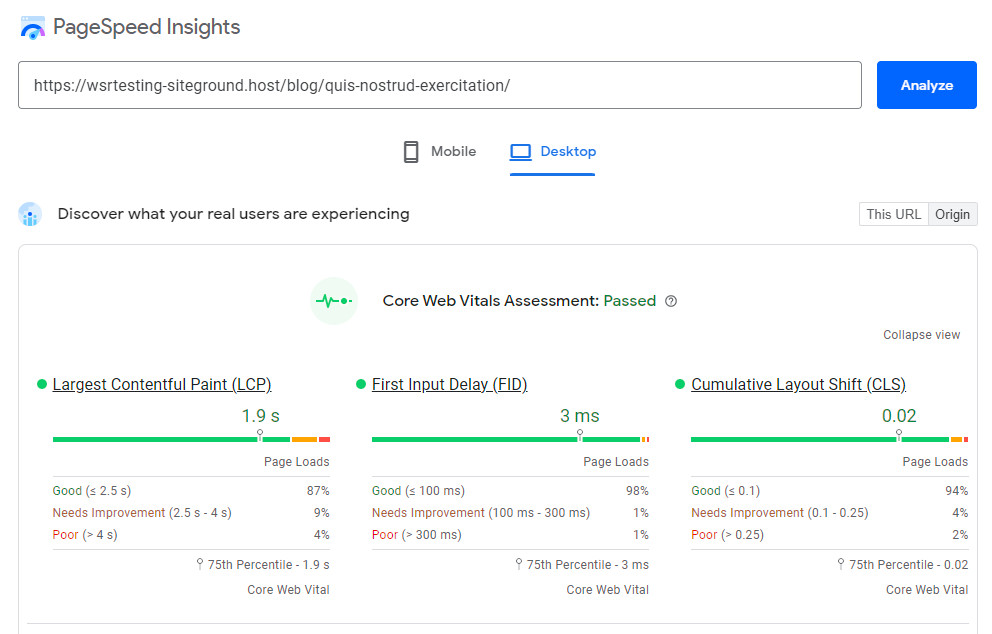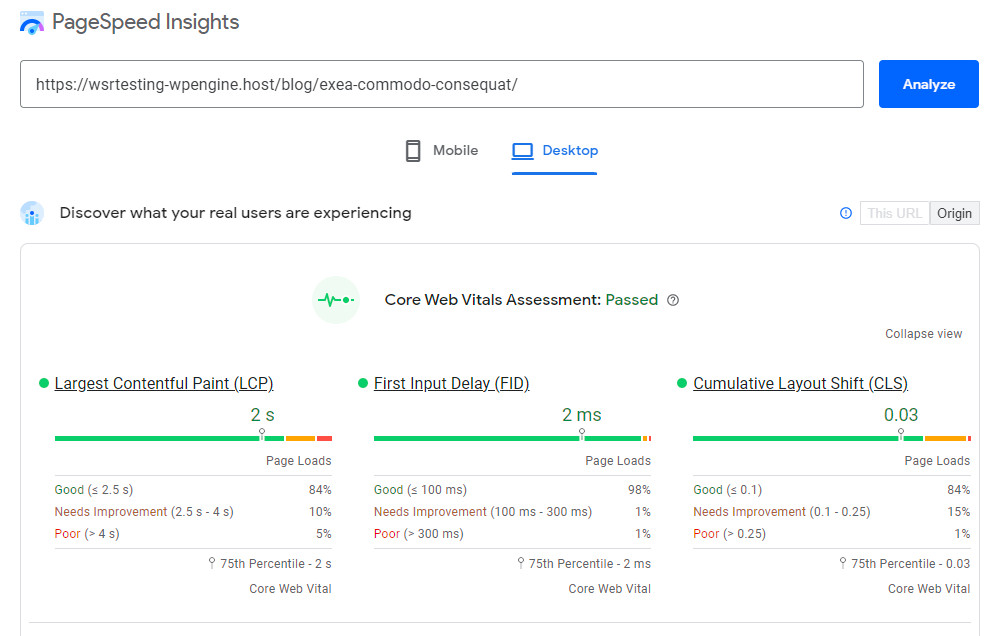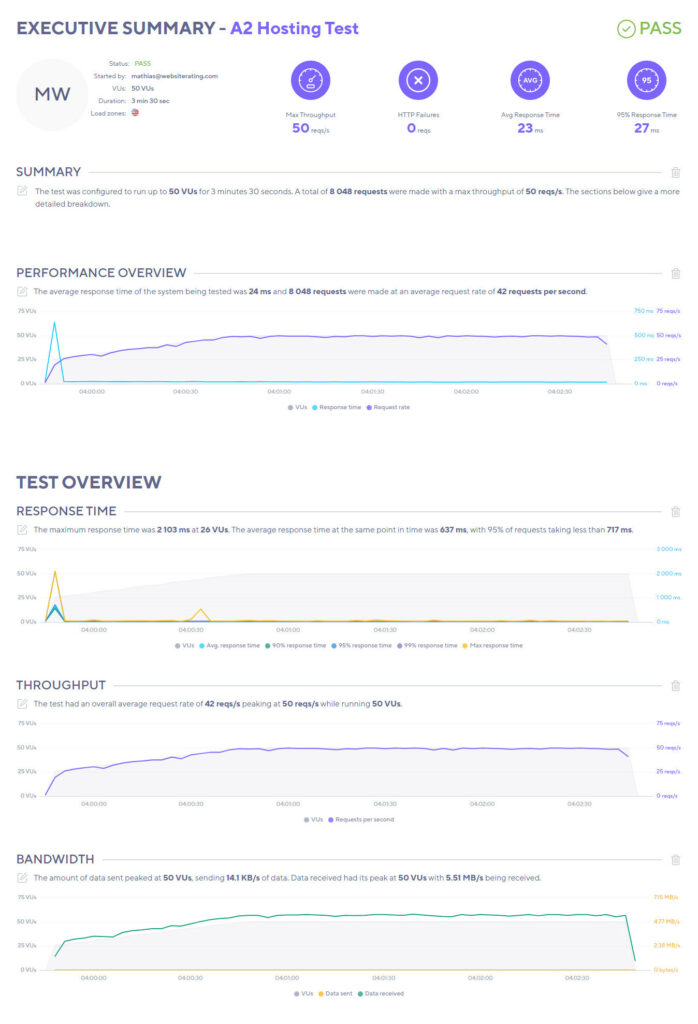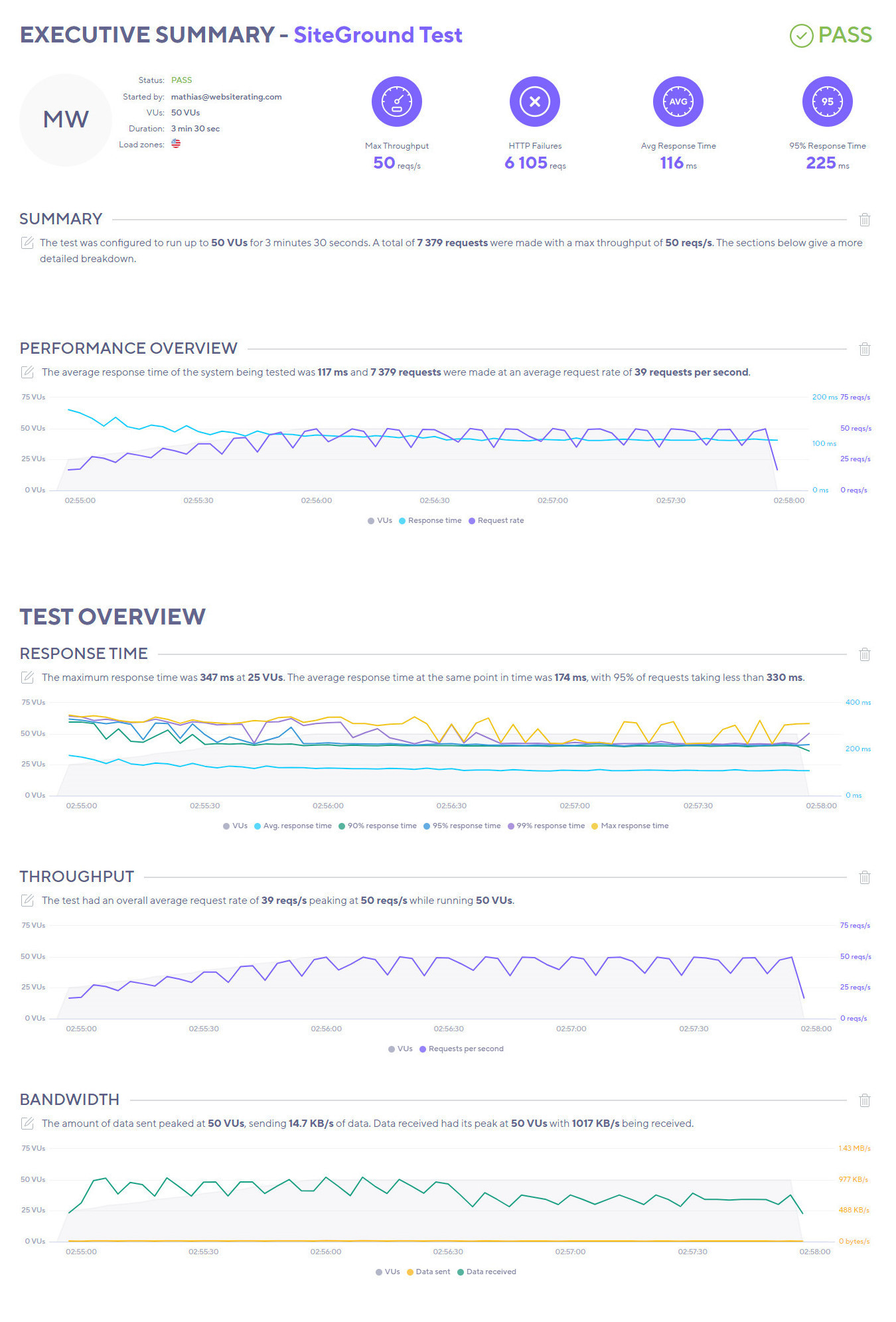This SiteGround vs A2 Hosting comparison gives you a detailed, data-driven comparison of these two WordPress hosts across multiple performance metrics to help you decide which service best meets your needs. To understand how A2 Hosting stacks up against SiteGround, let’s dive into the specifics.
When confronted with the choice of all the available WordPress hosting providers, it’s easy to lose your way.
| Feature | SiteGround | A2 Hosting |
|---|---|---|
| Pricing | GoGeek plan starts from $7.99/month | From $2.99/month |
| SLA | 99.9% uptime | 99.9% uptime |
| Hosting types offered | Managed WordPress and WooCommerce, shared, reseller, cloud and dedicated hosting. | Managed WordPress and WooCommerce, shared, reseller, VPS and dedicated hosting. |
| Speed and performance | SSD persistent storage. Custom PHP and MySQL. GZIP compression. SuperCacher. NGINX Direct Delivery. SiteGround CDN 2.0. CSS & HTML modifications. PHP 8.0 and 8.1. DNS management. | A2 optimized Turbo Servers. Linux Litespeed web server. NVMe SSDs on A2’s AMD EPYC servers. PHP 8.0 and 8.1. TurboCached/MemcacheOP Cache, Redis. |
| WordPress | Free WordPress installation. Auto-updating. 1-click staging. Free WordPress migration. | Free WordPress migration. Free JetPack. Cloning and staging. Imunify360 security. |
| Servers | Google Cloud Platform | Apache, LiteSpeed |
| Security | Free SSL. Automatic daily backups. AI Anti-bot24/7 server monitoring. Smart WAF. Distributed backups. Free WordPress security plugin. | Free SSL. Perpetual security. Free Hackscan. 24/7 server monitoring. Enhanced WordPress security (on some plans). Automatic hardening. JackBackup file recovery. |
| Control Panel | Site Tools (proprietory) | cPanel |
| Extra Goodies | 24/7 premium support. Unlimited email accounts. 100% renewable energy match. | 24/7, 365 live chat, phone, and email ticket support. |
| Money-back guarantee | 30 days | 30 days |
| Current deal | Get up to 83% OFF SiteGround's plans | Use code webrating51 & get 51% OFF |
They all promise to provide the best, serve you the best, and just generally be the best at everything, all the time.
However, bold claims must be backed up with cold hard facts. Otherwise, they’re not worth the screen they’re displayed on.
Through my extensive testing and reviewing of hosting platforms, I know only too well that these claims often don’t hold water. Or, they’re true, but only if you pay huge sums of money.
Both SiteGround and A2 Hosting claim to be the fastest, speediest, and best at what they do. But are they being truthful? And if so, which platform reigns supreme?
I’ve jumped into both platforms and stripped them for parts so you can see exactly what each offers. And, more importantly, which one is worth your time and money?
Plans & Pricing
First things first, let’s see how the two platforms stack up against each other in terms of affordability.
SiteGround Pricing Plans
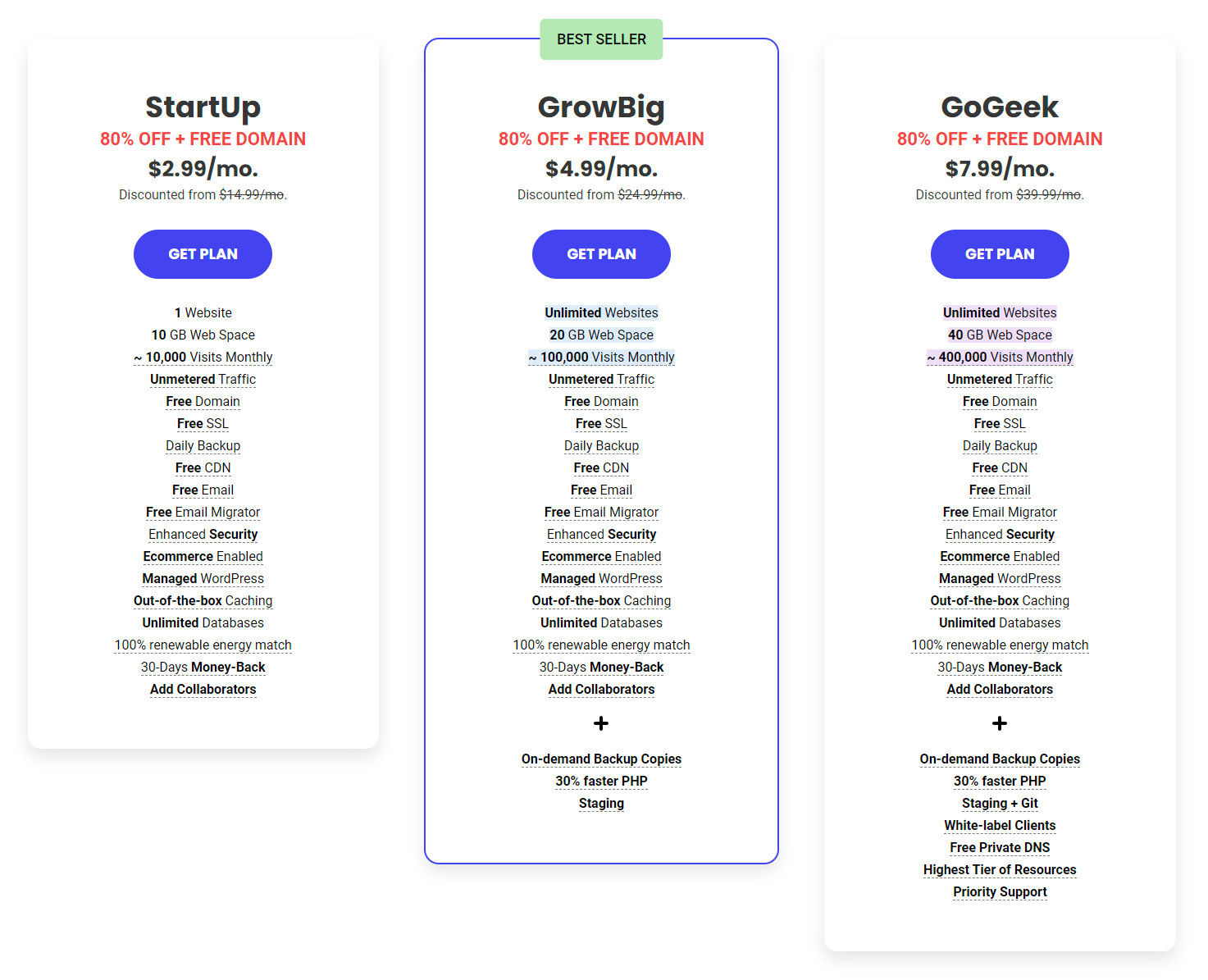
SiteGround keeps things nice and simple by providing three plans to select from:
- StartUp: From $2.99/month
- GrowBig: From $4.99/month
- GoGeek: From $7.99/month
SiteGround’s GoGeek plan is their most powerful plan. With the Startup plan, SiteGround will manage one website, and with the GrowBig and GoGeek plans, they’ll manage unlimited sites for you.
Visit SiteGround for more information and their latest deals… or check out our SiteGround review here.
A2 Hosting Pricing Plans
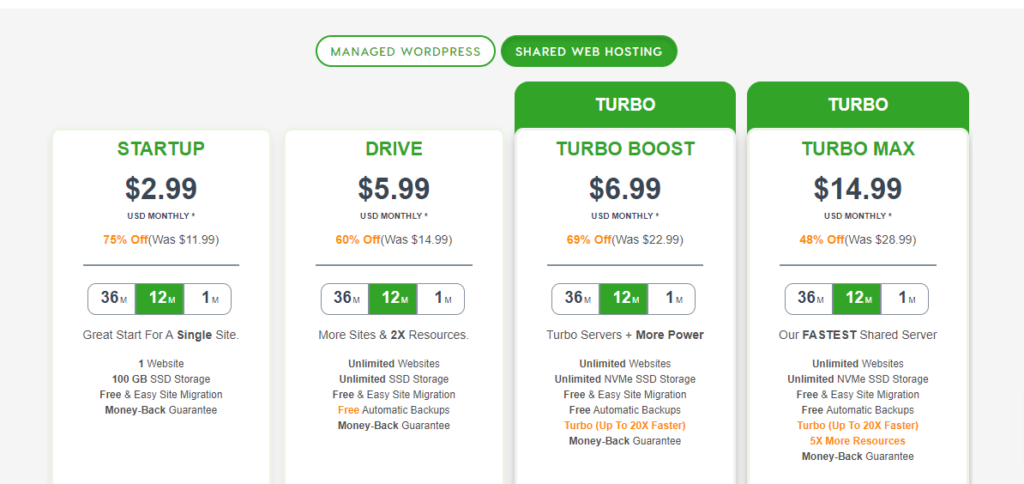
A2 has four plans to choose from. All are payable on a monthly, annual, or 36-month basis:
- Startup: From $2.99/month
- Drive: From $5.99/month
- Turbo Boost: From $6.99/month
- Turbo Max: From $14.99/month
A2 Hosting offers the most affordable pricing plans, so if you’re a small business or a startup that has a tight budget, you can choose the StartUp plan, the perfect solution if you want to manage only one WordPress website. Also, if you’d like to cancel any of the plans offered by A2 Hosting in the first 30 days after subscribing, you’ll get a refund.
Visit A2 Hosting for more information and their latest deals… or check out our review of A2 Hosting here.
🏆 Winner is A2 Hosting
Okay, so SiteGround does have ever so slightly cheaper promotional rates – but only just. However, the idea is to stick with a hosting provider long-term, so the standard rates count more than the promotional ones. And in the case of our two platforms, A2 Hosting is cheaper than SiteGround.
Admittedly, there isn’t much in it, but every dollar counts, right?
Performance, Speed & Reliability
Next up, the reason we’re all here. Hosting platforms must provide excellent performance and reliability; otherwise, why are we even here?
In this section, you will find out…
- Why site speed matters… a lot!
- How fast a site hosted on A2 Hosting and SiteGround loads. We will test their speed and server response time against Google’s Core Web Vitals metrics.
- How a site hosted on A2 Hosting and SiteGround performs with traffic spikes. We will test how they perform when faced with increased site traffic.
The most important performance metric that you should look for in a web host is speed. Visitors to your site expect it to load fast instant. Site speed not only affects user experience on your site, but it also affects your SEO, Google rankings, and conversion rates.
But, testing site speed against Google’s Core Web Vitals metrics isn’t enough on its own, as our testing site does not have substantial traffic volume. To evaluate the efficiency (or inefficiency) of the web host’s servers when faced with increased site traffic, we use a testing tool called K6 (formerly called LoadImpact) to send virtual users (VU) to our test site.
Why Site Speed Matters
Did you know that:
- Pages that loaded in 2.4 seconds had a 1.9% conversion rate.
- At 3.3 seconds, the conversion rate was 1.5%.
- At 4.2 seconds, the conversion rate was less than 1%.
- At 5.7+ seconds, the conversion rate was 0.6%.
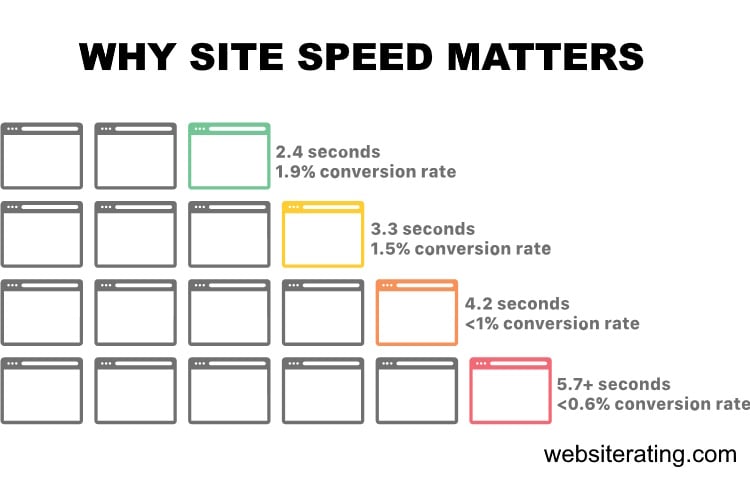
When people leave your website, you lose not only potential revenue but also all the money and time you spent generating traffic to your website.
And if you want to get to the first page of Google and stay there, you need a website that loads up fast.
Google’s algorithms prefer displaying websites that offer a great user experience (and site speed is a huge factor). In Google’s eyes, a website that offers a good user experience generally has a lower bounce rate and loads up fast.
If your website is slow, most visitors will bounce back, resulting in a loss in search engine rankings. Also, your website needs to load up fast if you want to convert more visitors into paying customers.
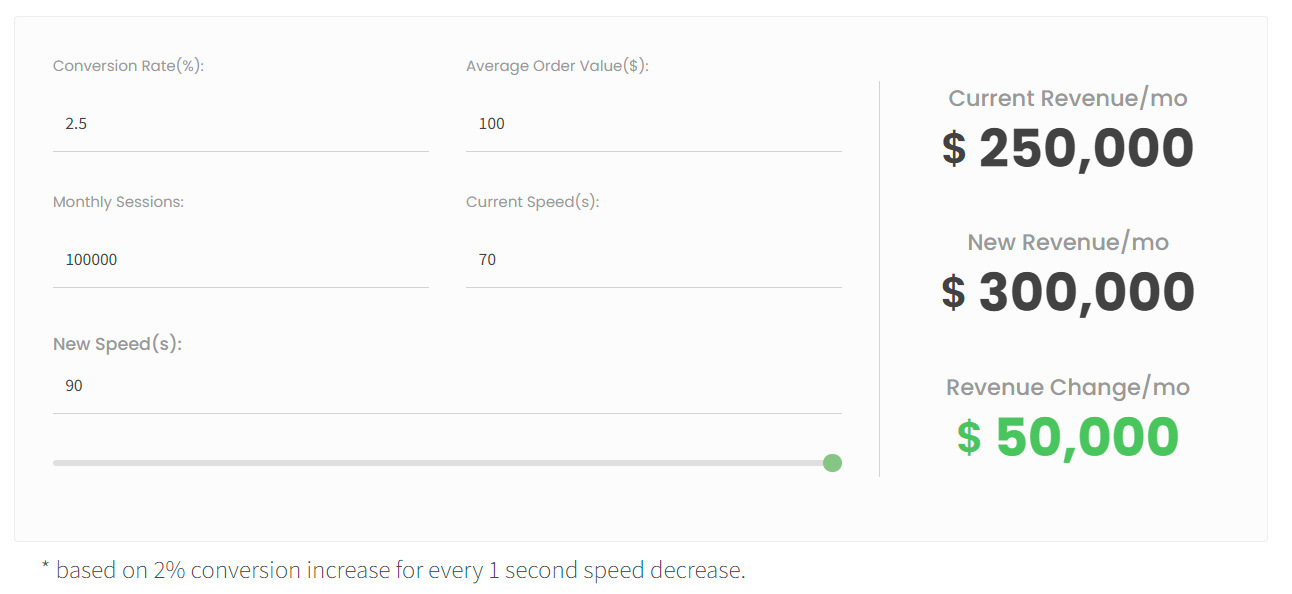
If you want your website to load up fast and secure the first spot in search engine results, you will need a fast web hosting provider with server infrastructure, CDN and caching technologies that are fully configured and optimized for speed.
The web host you choose to go with will significantly impact how fast your website loads.
How We Perform the Testing
We follow a systematic and identical process for all the web hosts we test.
- Buy hosting: First, we sign up and pay for the web host’s entry-level plan.
- Install WordPress: Then, we set up a new, blank WordPress site using the Astra WordPress theme. This is a lightweight multipurpose theme and serves as a good starting point for the speed test.
- Install plugins: Next, we install the following plugins: Akismet (for spam protection), Jetpack (security and backup plugin), Hello Dolly (for a sample widget), Contact Form 7 (a contact form), Yoast SEO (for SEO), and FakerPress (for generating test content).
- Generate content: Using the FakerPress plugin, we create ten random WordPress posts and ten random pages, each containing 1,000 words of lorem ipsum “dummy” content. This simulates a typical website with various content types.
- Add images: With the FakerPress plugin, we upload one unoptimized image from Pexels, a stock photo website, to each post and page. This helps evaluate the website’s performance with image-heavy content.
- Run the speed test: we run the last published post in Google’s PageSpeed Insights Testing tool.
- Run the load impact test: we run the last published post in K6’s Cloud Testing tool.
How We Measure Speed & Performance
The first four metrics are Google’s Core Web Vitals, and these are a set of web performance signals that are critical to a user’s web experience on both desktop and mobile devices. The last fifth metric is a load impact stress test.
1. Time to First Byte
TTFB measures the time between the request for a resource and when the first byte of a response begins to arrive. It’s a metric for determining the responsiveness of a web server and helps identify when a web server is too slow to respond to requests. Server speed is basically entirely determined by the web hosting service you use. (source: https://web.dev/ttfb/)
2. First Input Delay
FID measures the time from when a user first interacts with your site (when they click a link, tap a button, or use a custom, JavaScript-powered control) to the time when the browser is actually able to respond to that interaction. (source: https://web.dev/fid/)
3. Largest Contentful Paint
LCP measures the time from when the page starts loading to when the largest text block or image element is rendered on the screen. (source: https://web.dev/lcp/)
4. Cumulative Layout Shift
CLS measures unexpected shifts in the display of content in the loading of a web page due to image resizing, ad displays, animation, browser rendering, or other script elements. Shifting layouts lower the quality of the user experience. This can make visitors confused or require them to wait till the webpage loading is completed, which takes more time. (source: https://web.dev/cls/)
5. Load Impact
Load impact stress testing determines how the web host would handle 50 visitors simultaneously visiting the test site. Speed testing alone isn’t enough to test performance, as this test site doesn’t have any traffic to it.
To be able to evaluate the efficiency (or inefficiency) of a web host’s servers when faced with increased site traffic, we used a testing tool called K6 (formerly called LoadImpact) to send virtual users (VU) to our test site and stress test it.
These are the three load impact metrics we measure:
Average response time
This measures the average duration it takes for a server to process and respond to client requests during a specific test or monitoring period.
The average response time is a useful indicator of the overall performance and efficiency of a website. Lower average response times generally indicate better performance and a more positive user experience, as users receive quicker responses to their requests.
Maximum response time
This refers to the longest duration it takes for a server to respond to a client’s request during a specific test or monitoring period.This metric is crucial for evaluating the performance of a website under heavy traffic or usage.
When multiple users access a website simultaneously, the server must handle and process each request. Under high load, the server may become overwhelmed, leading to an increase in response times. The maximum response time represents the worst-case scenario during the test, where the server took the longest time to respond to a request.
Average request rate
This is a performance metric that measures the average number of requests per unit of time (usually per second) that a server processes.
The average request rate provides insights into how well a server can manage incoming requests under various load conditions. A higher average request rate indicates that the server can handle more requests in a given period, which is generally a positive sign of performance and scalability.
⚡Speed & Performance Test Results
The table below compares web hosting companies’ performance based on four key performance indicators: average Time to First Byte, First Input Delay, Largest Contentful Paint, and Cumulative Layout Shift. Lower values are better.
| Company | TTFB | Avg TTFB | FID | LCP | CLS |
|---|---|---|---|---|---|
| SiteGround | Frankfurt: 35.37 ms Amsterdam: 29.89 ms London: 37.36 ms New York: 114.43 ms Dallas: 149.43 ms San Francisco: 165.32 ms Singapore: 320.74 ms Sydney: 293.26 ms Tokyo: 242.35 ms Bangalore: 408.99 ms | 179.71 ms | 3 ms | 1.9 s | 0.02 |
| Kinsta | Frankfurt: 355.87 ms Amsterdam: 341.14 ms London: 360.02 ms New York: 165.1 ms Dallas: 161.1 ms San Francisco: 68.69 ms Singapore: 652.65 ms Sydney: 574.76 ms Tokyo: 544.06 ms Bangalore: 765.07 ms | 358.85 ms | 3 ms | 1.8 s | 0.01 |
| Cloudways | Frankfurt: 318.88 ms Amsterdam: 311.41 ms London: 284.65 ms New York: 65.05 ms Dallas: 152.07 ms San Francisco: 254.82 ms Singapore: 295.66 ms Sydney: 275.36 ms Tokyo: 566.18 ms Bangalore: 327.4 ms | 285.15 ms | 4 ms | 2.1 s | 0.16 |
| A2 Hosting | Frankfurt: 786.16 ms Amsterdam: 803.76 ms London: 38.47 ms New York: 41.45 ms Dallas: 436.61 ms San Francisco: 800.62 ms Singapore: 720.68 ms Sydney: 27.32 ms Tokyo: 57.39 ms Bangalore: 118 ms | 373.05 ms | 2 ms | 2 s | 0.03 |
| WP Engine | Frankfurt: 49.67 ms Amsterdam: 1.16 s London: 1.82 s New York: 45.21 ms Dallas: 832.16 ms San Francisco: 45.25 ms Singapore: 1.7 s Sydney: 62.72 ms Tokyo: 1.81 s Bangalore: 118 ms | 765.20 ms | 6 ms | 2.3 s | 0.04 |
| Rocket.net | Frankfurt: 29.15 ms Amsterdam: 159.11 ms London: 35.97 ms New York: 46.61 ms Dallas: 34.66 ms San Francisco: 111.4 ms Singapore: 292.6 ms Sydney: 318.68 ms Tokyo: 27.46 ms Bangalore: 47.87 ms | 110.35 ms | 3 ms | 1 s | 0.2 |
| WPX Hosting | Frankfurt: 11.98 ms Amsterdam: 15.6 ms London: 21.09 ms New York: 584.19 ms Dallas: 86.78 ms San Francisco: 767.05 ms Singapore: 23.17 ms Sydney: 16.34 ms Tokyo: 8.95 ms Bangalore: 66.01 ms | 161.12 ms | 2 ms | 2.8 s | 0.2 |
- Time to First Byte (TTFB): This metric measures the time taken from the user making an HTTP request to the first byte of the page being received by the client’s browser. Lower TTFB is better because it means that the server can respond quickly to a request. For SiteGround, the average TTFB is 179.71 ms which is relatively fast. The shortest TTFB was recorded in Amsterdam (29.89 ms), while the longest TTFB was in Bangalore (408.99 ms). For A2 Hosting, the average TTFB is significantly higher at 373.05 ms. The shortest TTFB was recorded in Sydney (27.32 ms), while the longest TTFB was in Amsterdam (803.76 ms).
- First Input Delay (FID): This metric measures the time from when a user first interacts with a page to the time when the browser is able to respond to that interaction. Lower FID is better because it indicates the page is more responsive.SiteGround’s FID is 3 ms, while A2 Hosting’s FID is slightly better at 2 ms.
- Largest Contentful Paint (LCP): This metric measures the time from when the page starts loading to when the largest text block or image element is rendered on the screen. Lower LCP is better because it means the page is visually ready faster.SiteGround’s LCP is 1.9 seconds, while A2 Hosting’s LCP is slightly worse at 2 seconds.
- Cumulative Layout Shift (CLS): This metric measures the sum total of all individual layout shift scores for every unexpected layout shift that occurs during the entire lifespan of the page. Lower CLS is better because it means the page is more stable and less likely to shift around as it loads.SiteGround’s CLS is 0.02, while A2 Hosting’s CLS is slightly worse at 0.03.
SiteGround performs better in terms of TTFB and LCP, while A2 Hosting is marginally better in terms of FID. Both companies could work on improving their CLS, but it’s still relatively low for both. Considering all these factors, SiteGround provides a better user experience, particularly in terms of speed.
⚡Load Impact Test Results
The table below compares web hosting companies’ performance based on three key performance indicators: Average Response Time, Highest Load Time, and Average Request Time. Lower values are better for Average Response Time and Highest Load Time, while higher values are better for Average Request Time.
| Company | Avg Response Time | Highest Load Time | Avg Request Time |
|---|---|---|---|
| SiteGround | 116 ms | 347 ms | 50 req/s |
| Kinsta | 127 ms | 620 ms | 46 req/s |
| Cloudways | 29 ms | 264 ms | 50 req/s |
| A2 Hosting | 23 ms | 2103 ms | 50 req/s |
| WP Engine | 33 ms | 1119 ms | 50 req/s |
| Rocket.net | 17 ms | 236 ms | 50 req/s |
| WPX Hosting | 34 ms | 124 ms | 50 req/s |
- Average Response Time: This is the average time taken by the server to respond to a request. Lower response time is better as it means that the server can handle requests faster, leading to a quicker loading time for the end user.A2 Hosting’s average response time is 23 ms, which is remarkably good and shows that their servers are very fast.SiteGround’s average response time is considerably higher at 116 ms, which, although higher than A2 Hosting, is still considered acceptable.
- Highest Load Time: This metric measures the maximum time taken for a response during peak load times. Lower load times are better as they indicate the server can handle peak traffic efficiently.A2 Hosting’s highest load time is 2103 ms, which is quite high and may result in noticeable delays for users during periods of high traffic.SiteGround, on the other hand, has a much lower highest load time at 347 ms, indicating it can handle peak loads far more efficiently than A2 Hosting.
- Average Request Time: This is the average number of requests that a server can handle per second. Higher values are better as they show that the server can handle more requests simultaneously. Both A2 Hosting and SiteGround can handle 50 requests per second, which is a good capability and shows that they are well-equipped to handle multiple simultaneous requests.
A2 Hosting has a lower average response time but struggles with the highest load time. On the other hand, SiteGround may respond slightly slower on average but performs much better during peak load times. Both companies have the same capability in handling the number of requests per second. In terms of consistent performance and reliability under heavy traffic, SiteGround is the better choice.
SiteGround Performance Features
SiteGround achieves excellent uptime stats through its exclusive use of the Google Cloud Platform. Currently, there are ten data center locations to choose from. The advantage here is that Google is a well-established IaaS known for its enterprise-class UPS technology.
What this means for you is that you get a high level of redundancy for critical components and an uninterrupted network (as shown by the 100% uptime).
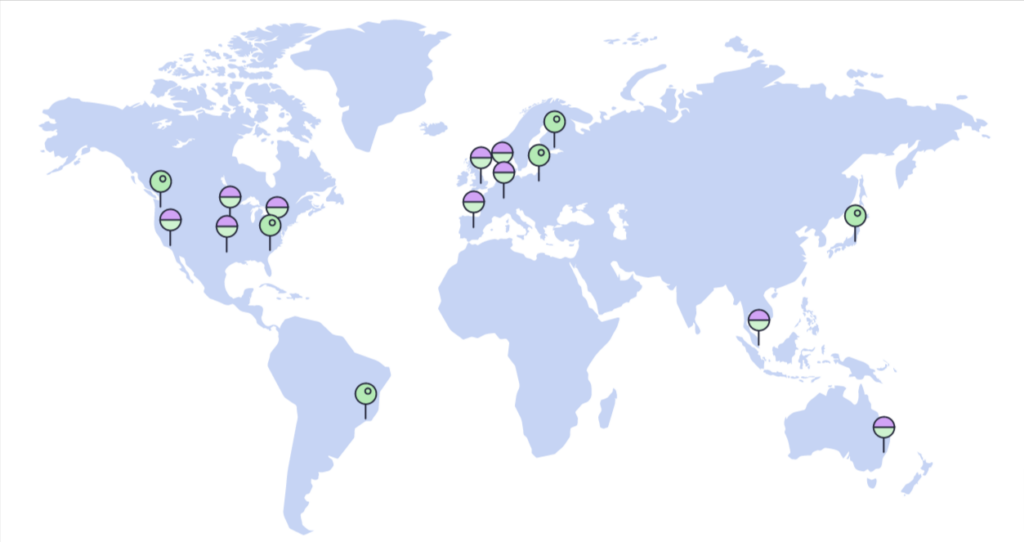
This tech setup is particularly beneficial if you live in the USA or Europe since that’s where most of the data centers are located. Each of them delivers low latency, reliability, and very high availability for any of your SiteGround-hosted sites.
One big bonus is that SiteGround includes a CDN on all its plans. This powerful piece of technology is present in 16 locations globally. This wide coverage delivers fast and reliable caching no matter where you are based.
This works by caching data in the nearest CDN location to where the site visitor is based. This allows the data to be served up faster since it has less distance to travel. SiteGround claims this feature provides speed improvement of at least 20% and up to 100% in more remote corners of the world.
SiteGround’s CDN also automatically detects and blocks malicious traffic, so it’s greatly beneficial in keeping your site safe and sound. Plus, it handily provides all your traffic stats so you can see where your site visitors are coming from.
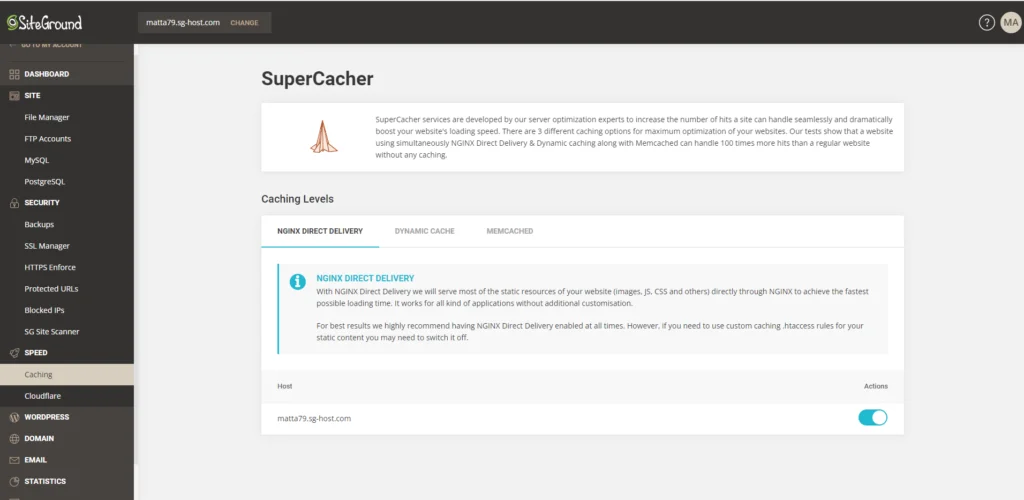
Now we’ve got something interesting. SiteGround’s “Super Cacher.” With a name like that, it should wear a mask and cape, right?
Does Super Cacher live up to its name, though? I think so.
This is high-end software that provides cached page results from database queries and dynamic pages. It achieves this through three different caching levels:
- NGINX Direct Delivery: Caches static content and stores it in the server’s RAM
- Dynamic Cache: Time to first byte (TTFB) is speedier by caching non-static page elements
- Memcached: Application and database connection is improved and accelerates dynamic content load times
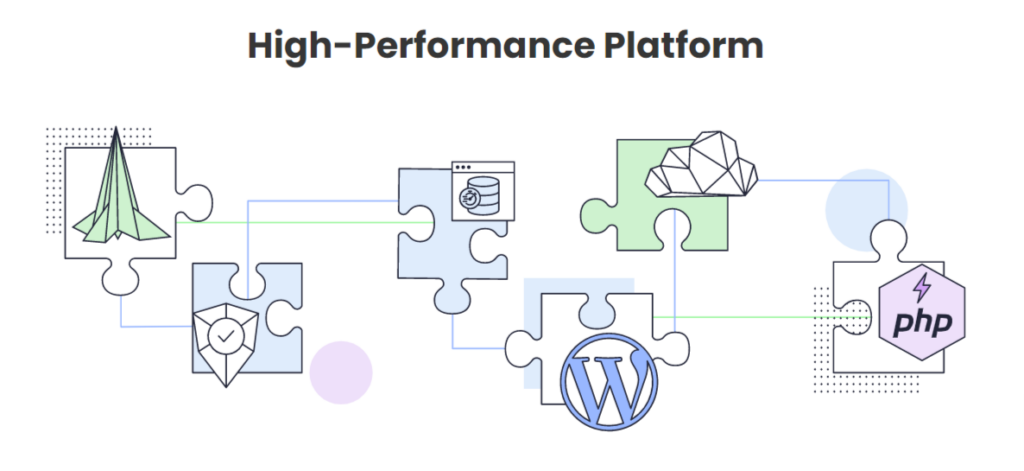
What else? Well, SiteGround has custom MySQL software that can swiftly and easily manage heavy MySQL queries. It does this by allowing large quantities of simultaneous parallel requests to be processed at once. This massively reduces slow query numbers by up to 20 times.
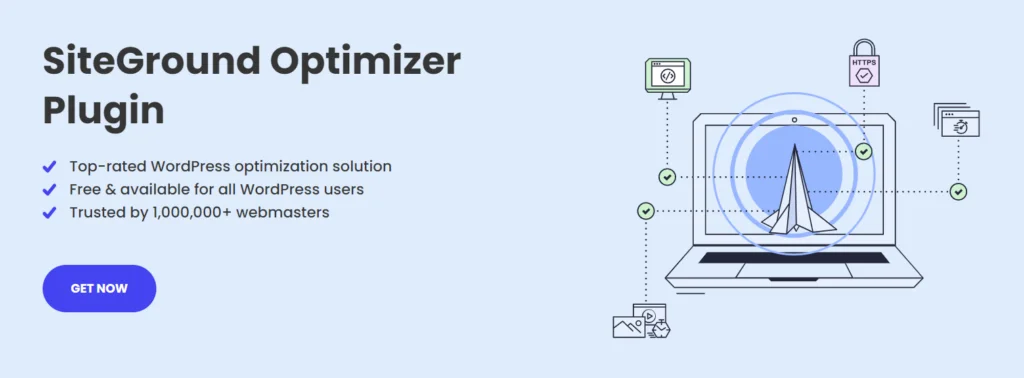
If you’re hosting a WordPress site, you get additional free tech in the form of SiteGround’s WordPress Optimizer plugin. The plugin lets you enable the HTTPS option and set the optimal version of PHP.
Additionally, the plugin provides image optimization, such as lazy-loading, minification, and more.
But the fun doesn’t stop there. SiteGround rounds off its impressive tech stack with the following:
- Compatible with the latest PHP versions, including 8.0 and 8.1
- GZIP compression
- CSS & HTML minifications
- Brotli compression
- Automatic WordPress updates
A2 Hosting Performance Features
The thing with A2 is that there are major differences between its lower and higher-priced plans. Its cheapest two plans only have access to standard speeds and performance, while the higher-priced plans utilize its Turbo Speed servers.
It’s hard to say what the standard servers perform like because A2 hosting concentrates all its efforts on promoting (and boasting about) its Turbo speeds.
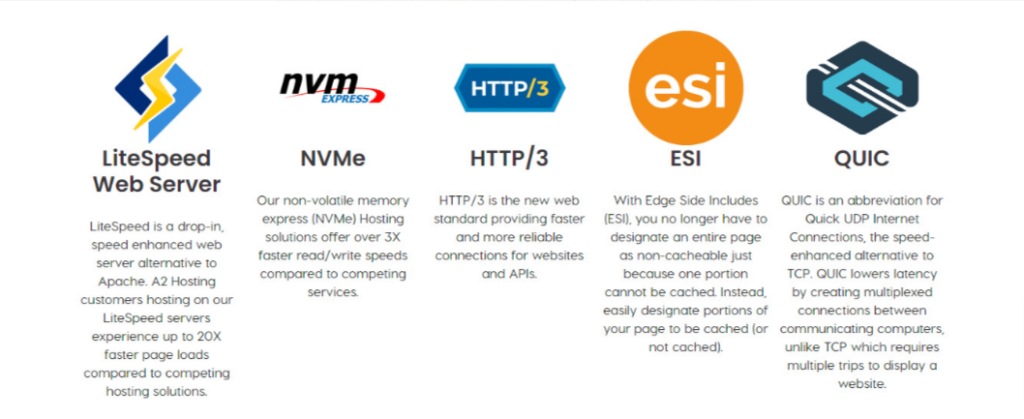
Rather than relying on a third-party IaaS, A2 Hosting makes use of its own Linux-based servers located in four data centers – two in the USA, one in Europe, and one in Asia.
If you subscribe to the Turbo plans, you then get access to NVMe SSDs on A2’s AMD EPYC servers, with pre-configured site caching. These top-shelf tech stacks provide up to 40% faster performance than its Linux servers.
Additionally, the Turbo options also net you 2 x faster TTFB (time to first byte) and 3 x faster read/write speeds thanks to its NVMe drives and Litespeed performance via its enhanced web server.
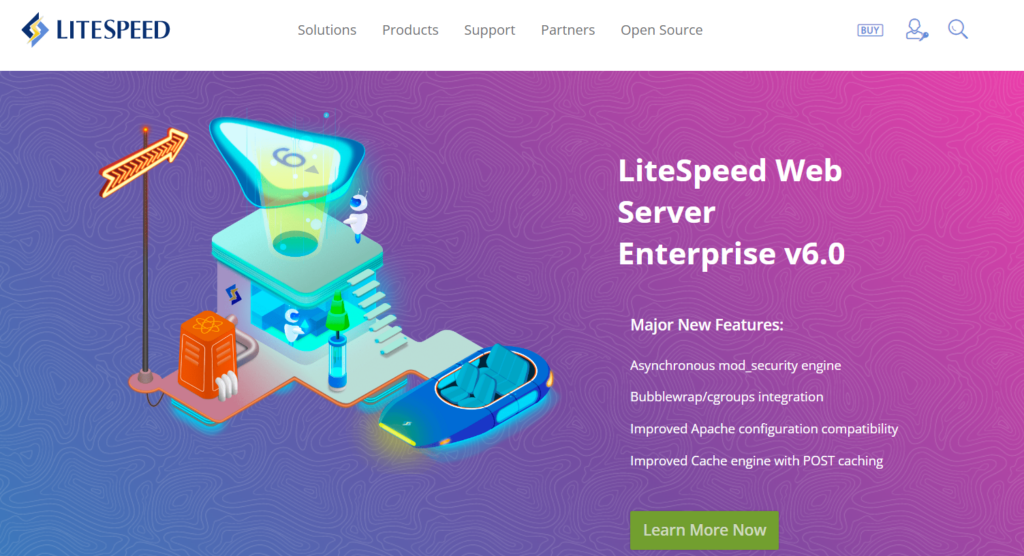
A2 also uses a Litespeed web server on ALL plans. This is a high-speed drop-in server replacement for Apache. The benefit of this setup is that it can provide performance up to 11 x better than Apache and 6 x better than NGINX. It’s truly powerful stuff.
A2 Optimized is proprietary software for WordPress users that promises the fastest page load speeds possible and features auto-optimization for things such as compression and caching. In fact, you get a big ‘ole bunch of caching tools:
- Turbo Cache: HTML content storage for up to 20 x faster page loads
- Memcached: Stores important data in the memory for faster MySQL speeds
- OPcache: Script storage for ultra-fast PHP performance
- Redis object caching: Caches individual parts to speed up loading times
The kicker? You only get these caching goodies by subscribing to the Turbo plans.
It’s a bit of a shame that A2 Hosting does not include Cloudflare CDN in its plans. Instead, the platform states that it is Cloudflare compatible, so if you wanted to pay the extra, you could purchase and integrate it with A2. The obvious downside here is that it’s going to drive up the price significantly.
Is there any more good stuff? Sure.
Here’s the rest of what A2 Hosting has to provide winning performance:
- Compatible with PHP 8.0 and 8.1
- Choose between MySQL and MariaDB databases
- Database auto updating
🏆 Winner is SiteGround
I don’t like having to significantly upgrade my plan to access the best quality tech, and A2 Hosting makes you do just that. All the good stuff is only available with its higher-tier Turbo plans which makes me wonder why they bother having the lower-tier plans in the first place.
SiteGround, on the other hand, includes all its tech on all plans. So even if you subscribe to the cheapest option, you’re still getting the best, including a CDN.
Remember, we’re balancing value with performance here, so in this case, SiteGround gets my vote.
Security Features
Security is as vital as the performance, so we need to be sure that our chosen provider is supplying enough security to rival Fort Knox.
SiteGround Security Features
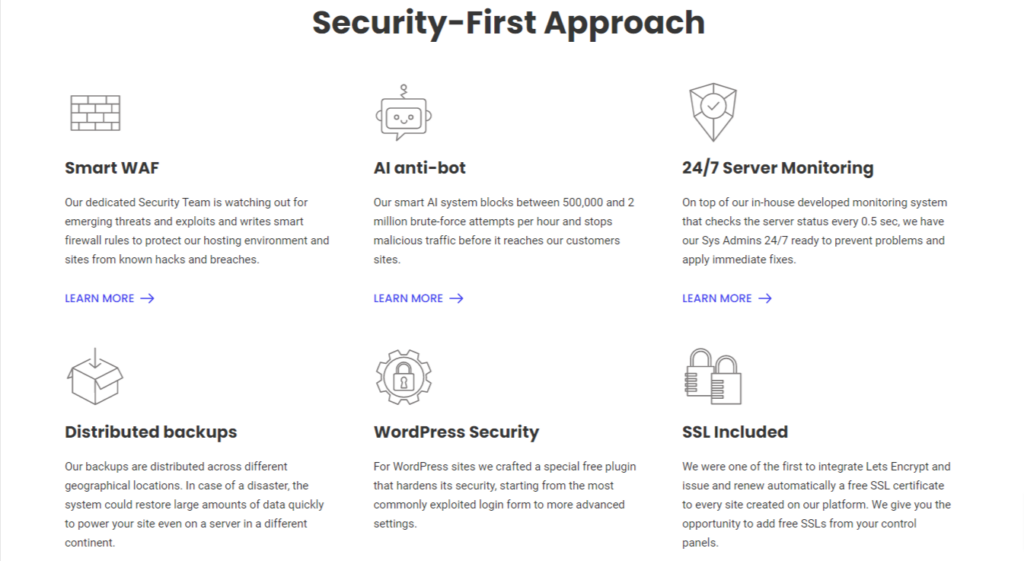
SiteGround really packs a punch with its security features. Those malicious bits of code stand no chance here. All SiteGround plan holders can enjoy:
- Hardware and software firewall filtering for DDoS attack protection
- Free Wildcard SSL
- Free standard SSL
- Site scanner malware early detection system
- WAF with continuous patching
- In-house server monitoring – checks the system over 0.5 seconds with auto issue fixing
- AI-powered anti-bot protection
- Geographically distributed auto daily backups
- 30-day backup copy storage
- Five copies of on-demand backup copies
- 1-click staging environment
- Failed login monitoring and filtering
- Free SiteGround WordPress security plugin (optimize rules for site hardening, 2-factor authentication, and activity log)
A2 Hosting Security Features

A2 has proprietary software called “Perpetual Security” that provides a top level of security and safety for your hosted sites. Here’s what it gets you:
- Free Hackscan protection to block hacks before they can inflict damage
- KernalCare, providing daily, automatic, and rebootless kernel updates
- Reinforced DDoS protection
- Web hosting firewall
- Brute-force defense
- Auto-heal hosting protection
- Virus scanning
- Server hardening
- 24/7, 365 security monitoring
Plus, you have access to an additional range of security features, including:
- Two-factor authentication
- Virus scanner and firewall
- Automatic hardening
- JetBackup file recovery
- Free SSL certificates
- Immunify360 WordPress security
On the Turbo Boost and Turbo Max plans, WordPress users also get:
- A2 optimized unique WordPress login URL, auto WP updates, and WP ReCaptcha
- Site cloning and staging
- 1-click site security hardening
- Mass hardening and updates
- Security rollback
- Smart updates
🏆 Winner is SiteGround
Both platforms provide a super high level of security, but it’s a shame that A2 Hosting only offers enhanced WordPress security on the higher-tier plans. Furthermore, SiteGround provides a better backup and site copy retention service than A2, so in my view, this tips SiteGround over the edge.
Technical Support
SiteGround Technical Support

SiteGround covers all bases with its support offering. What I really like here is that you can actually phone someone rather than relying on text-based help. Here’s what you get:
- 24/7 live chat support
- Office hours phone service (available times and number vary by location)
- Email ticketing service ( only necessary for complex issues)
Testing out the service got me an instant live chat response (excellent) and around a minute’s wait to get an answer to my phone call. All in all, a thoroughly excellent result.
A2 Hosting Technical Support
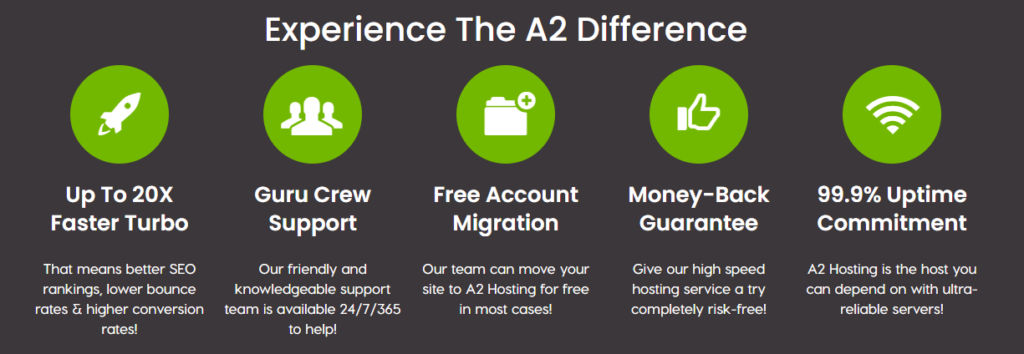
A2 Hosting has affectionately named its support team the “Guru Crew.” These are knowledgeable individuals on-hand waiting to solve your query. The advantage here is that you don’t have to wait for complex issues to be passed up the food chain, the initial person you deal with should be able to solve it easily.
Like SiteGround, A2 Hosting provides:
- Live chat support
- Phone support
- Email ticket support
The big difference here is that ALL support methods are available 24/7, 365. This is an incredible level of support when compared with other providers. Typically, it’s only live chat that’s always available. To be able to phone someone at 3 am is, quite frankly, brilliant.
🏆 Winner is SiteGround
Both SiteGround and A2 Hosting have excellent customer service levels, and you can’t go wrong with either of them. However, I can’t ignore the legions of fans that praise SiteGround for its stellar service.
For this to feature time and time again in online reviews, then it must be something truly special.
Common Questions Answered
Our Verdict ⭐
I’ll admit that I’ve long been a fan of SiteGround. I honestly feel there’s little out there that can match this platform’s value. And in the case of this comparison article, I believe it comes out on top again.
SiteGround stands out in the web hosting industry - they're not just about hosting your website but about enhancing your site's performance, security, and management. SiteGround's hosting package blends advanced technology and user-friendly features, ensuring your website operates at its best. Get premium website performance with Ultrafast PHP, optimized db setup, built-in caching & more! The ultimate hosting package with free email, SSL, CDN, backups, WP auto-updates, and much more.
SiteGround is a little more expensive than A2 Hosting, but then again, you don’t have to subscribe to the more expensive plans to get the better tech. And there’s no doubt that A2 provides a better level of customer service than SiteGround.
But when we bundle all of that together with security and performance, SiteGround strikes the perfect balance between them all.
So, sorry A2, but SiteGround gets my vote (again!). To see for yourself how good value SiteGround is, sign up here.
How We Review Web Hosts: Our Methodology
When we review web hosts, our evaluation is based on these criteria:
- Value for Money: What types of web hosting plans are on offer, and are they good value for money?
- User Friendliness: How user-friendly is the signup process, the onboarding, the dashboard? and so on.
- Customer Support: When we need help, how quickly can we get it, and is the support effective and helpful?
- Hosting Features: What unique features does the web host provide, and how do they stack up against competitors?
- Security: Are essential security measures like SSL certificates, DDoS protection, backup services, and malware/virus scans included?
- Speed and Uptime: Is the hosting service fast and reliable? What types of servers do they use, and how do they perform in tests?
For more details on our review process, click here.

